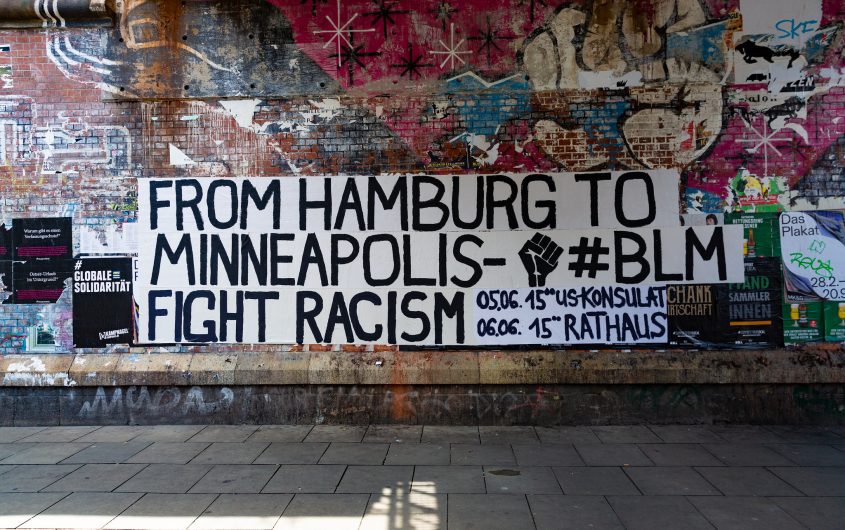
Rasande Tyskar via Flickr
Countering Racism and Anti-Extremism in Germany

Susanne Dieper
Director of Programs and Grants
Susanne Dieper is the Director of Programs and Grants at AICGS. She oversees the Institute’s programs and projects within the three AICGS program areas, manages all AICGS fellowships, and is in charge of grant writing. Her current focus is on issues related to transatlantic relations, immigration and integration, diversity, the next generation of leaders, workforce education, and reconciliation. She develops programs that align with the mission of AICGS to better understand the challenges and choices facing Germany and the United States in a broader global arena.
Previously, Ms. Dieper was in charge of organizational and project management at AICGS as well as human resource development and board of trustees relations. Prior to joining AICGS, she worked in transatlantic exchange programs, language acquisition, as well as the insurance industry in Germany.
Ms. Dieper holds an MBA from Johns Hopkins University with a concentration in International Business and an MA in English Linguistics and Literature, History, and Spanish from the University of Cologne. She has completed course work in nonprofit management at Johns Hopkins University.
__
On May 20, just days before the United States became engulfed in another serious crisis over the issue of racism and racial violence, the first meeting of the German federal government’s committee against right-wing extremism and racism (Kabinettausschuss zur Bekämpfung von Rechtsextremismus und Rassismus) occurred. The committee, newly created in March 2020, is a direct response to a series of violent crimes in Germany that have been attributed to perpetrators belonging to the extreme-right spectrum. Walter Lübke, a local political leader (CDU) in the state of Hesse, was murdered at his home a year ago on June 1, 2019. Police apprehended a self-professed neo-Nazi who, along with an accomplice, has been indicted in the case and is awaiting trial. Prior to his murder, Walter Lübke had been vocal about supporting refugees in Germany. On October 9, 2019, on the Jewish High Holiday of Yom Kippur, a synagogue in Halle (Saxony-Anhalt) was attacked by a man who, as he later confessed, wanted to kill Jews. Because he was unable to enter the synagogue, he killed two bystanders before police subdued him. He was apparently motived by the massacre that occurred in Christchurch, New Zealand, in March 2019. On February 19, 2020, an extremist murdered ten people in Hanau, Hesse, before killing himself. Among the victims were his mother and nine people with a minority background.
Integration, Racism, and Democracy—Intertwined
What followed was an intense national debate in Germany—about hate crimes, xenophobia, extremism, and the like—and in March 2020, at the 11th Integration Summit (the “Integrationsgipfel” has been held under the auspices of the chancellor since 2006), the German government announced the creation of a cabinet committee that addresses the issues of right-wing extremism and racism. It might be surprising to some observers that anti-racism efforts are discussed at the same time as integration matters, especially considering that most of the victims of the three aforementioned crimes were not recent immigrants (they were predominantly German citizens and individuals born in the country). However, a letter signed by several migration associations had urged the establishment of the cabinet committee. At the summit, both Chancellor Merkel and Annette Widmann-Mauz, Federal Minister of State for Migration, Refugees, and Integration, were unequivocal in their statements that racism needs to be recognized, defined as such, and countered effectively. Widmann-Mauz also declared that right-wing extremism currently represents the biggest threat in Germany. She further contended that an increasingly diverse German society contributes to the country’s strength and success and those who violently want to deny this need to be stopped. Federal Minister for Family Affairs, Senior Citizens, Women, and Youth Franziska Giffey, who is also on the committee, emphasized that the fight against racism and anti-extremism must go hand in hand with the strengthening of democracy and an open society in Germany. She also proclaimed that “Germany has a racism problem” and supported the notion that racism was made a central topic at the integration summit.
Federal Minister of the Interior Horst Seehofer, who chairs the cabinet committee, has highlighted the urgency of the issue as well and has announced that racism is “Chefsache” (deserving of attention at the highest level of government). He has referred to the trail of blood (“Blutspur”) that has been running through Germany since the neo-Nazi terrorist group NSU (Nationalsozialistischer Untergrund or National Socialist Underground) was exposed in 2011 and acknowledges that right-wing extremism, anti-Semitism, and racism count among the most serious dangers threatening the democratic fabric of the country. Prior to the establishment of the committee, in October 2019, the government had already compiled a series of measures to fight right-wing extremism and hate crime. The measures include fighting cyber-crimes, the protection of local politicians, further tightening of gun laws, and expanding crime prevention methods.
Reactions
The creation of the committee has been met with positive reactions from migrant organizations as well as the Central Council of Jews in Germany. Particular attention and appreciation have been given to the fact that the federal government is taking the issue seriously, at last. It marks the first time that a government committee has taken up these issues. Many have lamented that for too long a tendency had prevailed to attribute extremist crimes to demented individuals who, in reality, are connected to and imbedded in right-wing networks. These crimes can no longer be ignored. It is further important to acknowledge that racism and crimes motivated by extremist sentiments not only pose a danger to individuals, but also threaten the norms and values of a liberal democratic society. Interior minister Seehofer has emphasized that in defense of democracy, his office has already legally banned several terrorist associations this year, most recently the Lebanese militia group Hezbollah, which espouses an anti-Semitic, anti-Israel credo.
A Clear Need for Action
Notably, the cabinet meeting took place just a few days before the 2019 crime statistics were released. While crime rates overall have dropped, politically motivated crimes increased by 14 percent compared to 2018. More than half of those crimes have an extreme right background. At the same time, anti-Semitic crimes increased by 13 percent (93 percent of which were motivated by right-wing ideology), an all-time high since the collection of the data began almost twenty years ago; and anti-Islam crimes rose by 4.4 percent. Seehofer has stressed the necessity to remain vigilant vis-à-vis the danger that is emanating from a right-wing extremist spectrum.
While being declared a high priority by the chancellor and her ministers, German government institutions themselves are not immune to racism and racial violence, as several incidents within the military and police force have demonstrated. Anti-Semitic and racist ideology has also reared its ugly head in schools and public agencies and continues to be part of the rhetoric of the right-wing political party the Alternative for Germany (AfD). Seehofer and the cabinet committee certainly have their work cut out for themselves. It should also be noted that several of the COVID-19 anti-lockdown demonstrations in various German states have been attended by members of right-wing extremist groups and the so-called Reichsbürger, trying to co-opt the demonstrations to disseminate anti-government ideology and hatred—similar patterns can be observed in the United States. Several people were taken into custody but it is not a difficult feat to spread racist propaganda on German streets.
The United States in Turmoil
In the meantime, race relations in the United States are at a breaking point after a series of violent police actions against black Americans in recent weeks—several with deadly outcomes. Peaceful protests for racial equality and change as well as outrage over the death of George Floyd, a black man in Minneapolis, initially also devolved into destruction and looting in some cities—followed by increased police and national guard presence. The anger and frustration expressed are compounded by weeks of pandemic-induced lockdowns, economic despair, rising unemployment and disproportionate suffering among communities of color. The White House leadership is doing little to ease tensions or bring people together; instead, the president has added fuel to the fire with controversial Twitter messages and by declaring himself a president of “law and order.” On the evening of Monday, June 1, police dispersed peaceful protesters using tear gas and flash grenades to allow President Trump, Bible in hand, the opportunity for a photo at a nearby Washington, DC, church.
The backlash against this show of force has been fierce and has come from all sides of the political spectrum. The president’s aim so far has not been to sympathize with those who have suffered or those who protest alongside them, nor to provide much-needed words of calm and unity to a nation that is also still very much in turmoil from COVID-19. His response has been to use force and to blame the far-left movement antifa for the violence at demonstrations. He threatened to label the movement a terrorist group while ignoring the threat from neo-Nazi groups like The Atomwaffen Division, which, although small, is establishing itself in other countries around the world, much to the distress of some security experts and officials in Europe.
Racism as “Chefsache”—Global Demonstrations Demand as Much
And the president certainly and lamentably has not acknowledged that systemic racism deserves to become “Chefsache.” Instead, he frequently cites the economic gains African Americans have made under his presidency. Other state and local leaders are trying to fill the gap, along with the thousands of demonstrators around the United States who continue to call for police reform and anti-racism measures. Meanwhile, Democratic Members of Congress have introduced a bill that addresses racial bias and police misconduct.
Sympathetic protestors in several European cities and across the globe, including Berlin and other German cities, have expressed solidarity with the U.S. demonstrators. European government officials, among them German foreign minister Heiko Maas, have done the same. Demonstrators are not only protesting racism in the United States, but also in their own countries, Australia being one example. In Germany, demonstrators are also pointing to the persistent discrimination and racism people of color and different ethnicities are experiencing in their daily lives.
It will take a concerted effort on both sides of the Atlantic to counter racial violence and extremisms and to address the subtle acts of racism and discrimination that occur all too often. The predominantly young demonstrators are loudly and vehemently reminding their political leaders and anybody who is watching that the issue will no longer be ignored. In the twenty-first century, spreading hate and extremist rhetoric online is a fast and simple matter and the audience has been even more willing and captive to absorb it while social-distancing indoors. The new German cabinet committee and the measures already adopted represent an important step taken by the government and project the right message. It will take time, however, to put actions into place and a lot more is needed to eradicate hatred, xenophobia, and prejudice and for German society to finally recognize diversity as the norm and a source of strength and not something to hate or oppose.








